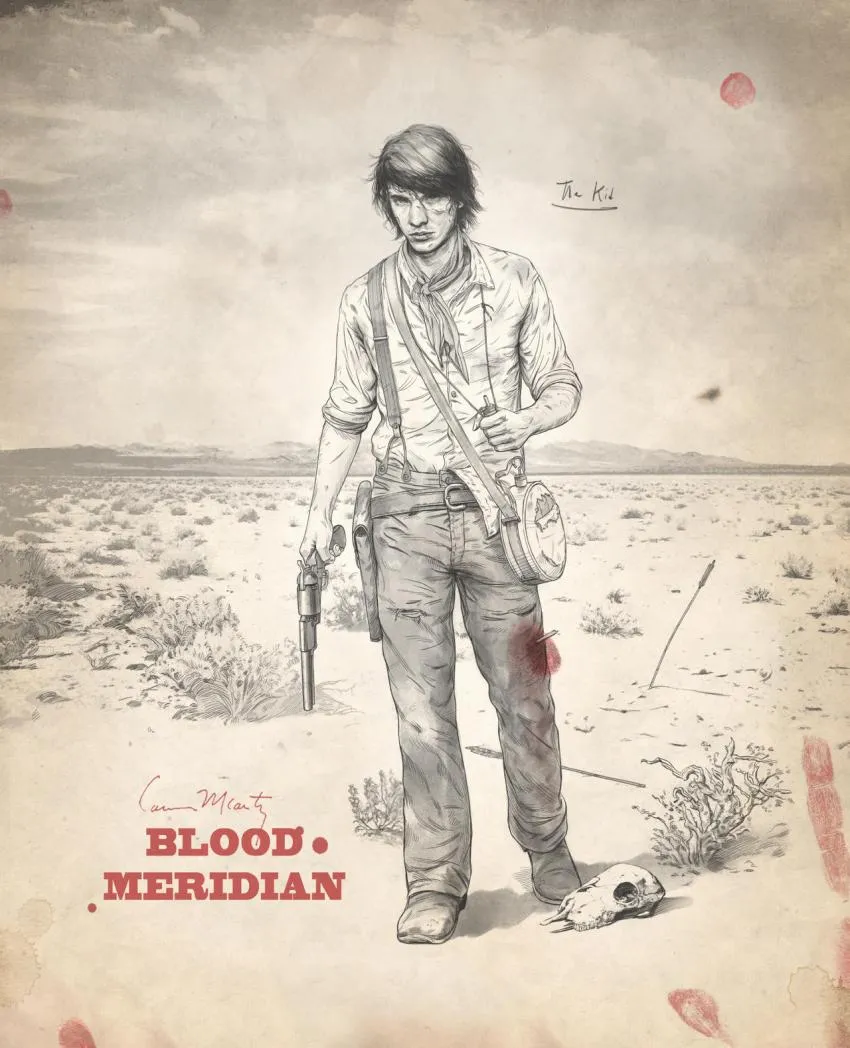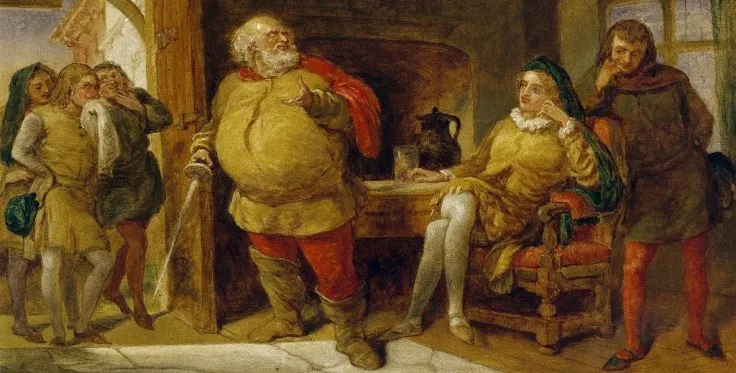Judge Holden And The Epitome Of Evil, A Blood Meridian Analysis

Cormac McCarthy's 1985 epic novel, Blood Meridian, has been hailed as one of the greatest pieces of writing of the 20th century. Taking inspiration from the real-life Glanton Gang, a group of scalp hunters that operated in the US-Mexico Borderlands during the 1840s, McCarthy sculpted a wonderfully intricate and disturbing world for his characters to breathe in.
Judge Holden from Blood Meridian is widely regarded as one of the most frightening villains in modern literature. His creepy appearance, violent nature, and his belief in evil have rooted him deeply in the world of literature as a man to be feared.
Indeed there was one character in the novel who was also taken from the real-life memoirs of the gang that stood out above the rest. His name was Judge Holden. McCarthy described him in the book: "The judge is a massive, hairless, albino man who excels in shooting, languages, horsemanship, dancing, music, drawing, diplomacy, science and anything else he seems to put his mind to. He is also the chief proponent and philosopher of the Glanton gang’s lawless warfare."

Judge Holden, A Mysterious Man
Similar to many great novels, Blood Meridian took inspiration from real life in order to establish the historical background for the plot. McCarthy borrowed heavily from Samuel Chamberlain, the very man who rode with the Glanton Gang. The author even based his protagonist, the kid, on Chamberlain.
Chamberlain knew the Judge well, and he had some interesting things to say about him. He said, "I hated him at first sight, and he knew it." Chamberlain also wrote: "Yet nothing could be more gentle and kind than his deportment towards me; he would often seek conversation with me."
Perhaps what is the most interesting aspect of the Judge, is his physical appearance. Chamberlain describes the Judge in his memoirs: "The second in command, now left in charge of the camp, was a man of gigantic size who rejoiced in the name of Holden, called Judge Holden of Texas. Who or what he was no one knew, but a more cooler-blooded villain never went unhung. He stood six foot six in his moccasins, had a large, fleshy frame, a dull, tallow-colored face destitute of hair, and all expression, always cool and collected."
The Judge is completely sheet-white, bald, and extremely large. He is also very violent. At multiple points in the story, he can be seen massacring innocents as well as harming children. Chamberlain tells of one such encounter where the real-life Judge committed atrocious acts: "And before we left Fronteras, a little girl of ten years was found in the chaparral foully violated and murdered. The mark of a huge hand on her little throat pointed out him as the ravisher as no other man had such a hand. But though all suspected, no one charged him with the crime. He was by far the best-educated man in northern Mexico."
Although Judge Holden was a part of the gang at one time, even acting as their leader and influencer on many occasions, he sought conflict with some of the members. This goes especially for the kid. During all of the terrible violence of the book, the kid remains empathetic and never commits to using violence other than to protect himself. As a believer in nihilism, as well as fatalism, the Judge took issue with the kid's outlook.

The Judge and The Kid, A Strange Story
A large part of the novel showcases various violent acts that the Glanton Gang commits on behalf of various entities. For instance, they hunt scalps for the Mexican Government, which pays them on a per-scalp basis. Mexico in this time period was wilder than ever, and the Glanton Gang was their way of pacifying the land.
However, The Judge's influence on the gang's leader, Joel Glanton, forces the gang into some pretty brutal stuff. The Judge and Glanton seem to have some unique pact. The more violence they commit, the more violence they want to commit. The Judge urges them on, demanding that they all dedicate themselves to destroying "the heathen". But, there is one gang member who refuses to be unnecessarily violent. This rubs the Judge the wrong way.
The kid and the Judge have a rather odd confrontation towards the end of the story that further illuminates their relationship. the Judge desires the kid, and when confronting him in jail, the Judge makes his intent clear. He says, "You broke with the body of which you were pledged a part and poisoned it in all its enterprise." The Judge further goes on to say that if the kid had trusted him, he'd have "loved [him] like a son."
Similar to his leadership role in the gang, his name (literally the Judge) gives another dimension to his decision on the content of the kid's heart. By saying this, the Judge insists that the kid stood back and judged the gang. Because the gang was his home and gave him purpose, the Judge berates the kid for his opinion. He thinks that the kid is a hypocrite, and a man who stands for nothing is a man who deserves the Judge's violent gaze.
The kid had a chance to kill the Judge in the desert, but for whatever reason, he could not pull the trigger. This serves to show his true nature to the Judge, and his suspicions are confirmed that the kid does have a heart. The kid's lack of commitment to violence abhors the Judge. After all, the Judge believes that "War is God."

The Ending of Blood Meridian, What Happened?
The ending of Blood Meridian is one of the most controversial and often-debated conclusions in all of modern literature. Basically, 30 years after the events of the Glanton Gang, the Judge and the kid (now the Man) meet up in a bar. The Judge's appearance hasn't changed at all, further adding to the mystique of the man. The Judge always survives, and his impervious nature to mortality foreshadows his supernatural existence.
After the Man enjoys a conjugal visit with a lady of the night, he makes his way to an outhouse on the property of the bar. When he enters, he is encountered by the naked Judge, who "gathered him in his arms against his immense and terrible flesh."
Although it is easy to assume that this passage implies some sort of depraved and violent act, it could be looked at figuratively as well. By this point in the novel, McCarthy has established the Judge as some kind of supernatural being.
If one were to try to decide what exactly the Judge is, they would really only have the information McCarthy himself has given the reader. As far as categorization goes, the author has this to say: "Whatever his antecedents he was something wholly other than their sum, nor was there system by which to divide him back into his origins for he would not go."
This implies that the world has never before seen a being like Judge Holden. In another sense, it also speaks to the mystery surrounding his origin. Since Holden often speaks of life in philosophical terms, seeming at times to be all-knowing, it is interesting that McCarthy has categorized him as something supernatural.
Of course, there is also the literal ending of Blood Meridian to consider. After the Man is dispatched from this world (however you imagine he was dealt with), the Judge heads back into the bar just in time for the dance. The last spoken words on the Judge by McCarthy are as follows: "His feet are light and nimble. He never sleeps. He says that he will never die. He dances in light and in shadow and he is a great favorite. He never sleeps, the judge. He is dancing, dancing. He says that he will never die."
It is this very quote that furthers the idea that Holden is an indestructible, evil force. Perhaps he is the personification of evil or war, as he is often known to give his opinions on the violent nature of man. Regardless of your interpretation, your understanding of Blood Meridian can be further extended by doing some research of your own. Check out the video below for some more information on the ending of Cormac McCarthy's epic western, Blood Meridian.
Opinions and Perspectives
I just finished Blood Meridian and I'm still trying to process Judge Holden's character. Has anyone else been equally disturbed by his presence throughout the novel?
The way McCarthy describes the Judge's physical appearance sends chills down my spine. A massive, hairless albino who never ages? It's brilliant how he blurs the line between human and supernatural.
What strikes me most is how the Judge embodies pure evil while maintaining this facade of civilization through his knowledge of science, music, and languages.
I disagree that he's purely evil. I think the Judge represents something more complex the unstoppable force of nature and war itself.
You know what's fascinating? The fact that he's based on a real historical figure from Chamberlain's memoirs. Makes it even more unsettling.
The scene where he meets the kid in jail really showcases his manipulative nature. I felt so uncomfortable reading their interaction.
Just joined this discussion and I have to point out that the Judge's philosophy about war being god is frighteningly relevant even today.
That ending in the outhouse still haunts me. I've read it three times and still can't fully grasp what McCarthy was trying to convey.
Anyone else notice how the Judge seems to represent different things throughout the novel? Sometimes he's death, sometimes war, sometimes just pure chaos.
The real mystery for me is why the kid couldn't shoot him in the desert. Was it fear or something deeper?
I actually found his dancing at the end more disturbing than any of the violent scenes. Something about that eternal nature really got to me.
The contrast between the kid's humanity and the Judge's complete lack of it really drives the whole narrative.
I've read a lot of villains in literature but none quite compare to Judge Holden. His combination of intelligence and brutality is unique.
The way he interacts with children throughout the novel makes my skin crawl. McCarthy really knew how to create true horror.
I think we're missing something important about his name being Judge. It's like he's passing judgment on humanity itself.
That's an interesting take. I always saw his title as ironic, given how he represents complete lawlessness.
The description from Chamberlain's memoirs matches so perfectly with McCarthy's version. Really shows how he built upon historical fact.
Am I the only one who sees parallels between the Judge and Melville's white whale? Both seem to represent something beyond human understanding.
His speeches about war and violence are some of the most memorable parts of the book. Terrifying but somehow poetic.
What gets me is how he excels at everything. It's like he's this perfect monster, which makes him even more terrifying.
The fact that he never sleeps or ages really adds to the supernatural element. Almost like he's beyond human limitations.
I honestly couldn't sleep well for days after reading the outhouse scene. McCarthy's writing is just too powerful.
The relationship between the Judge and Glanton is fascinating. It's like he corrupted Glanton's already dark nature.
His obsession with documenting everything in his notebook always struck me as particularly strange. Anyone else wonder about that?
I think the notebook represents his desire to control and possess knowledge of everything he encounters.
Looking at current events sometimes reminds me of the Judge's speeches about war. Scary how relevant they still are.
The scene where he buys those puppies just to throw them in the river still makes my blood boil.
I find it interesting how he's described as being educated yet commits such barbaric acts. Really shows the duality of his nature.


